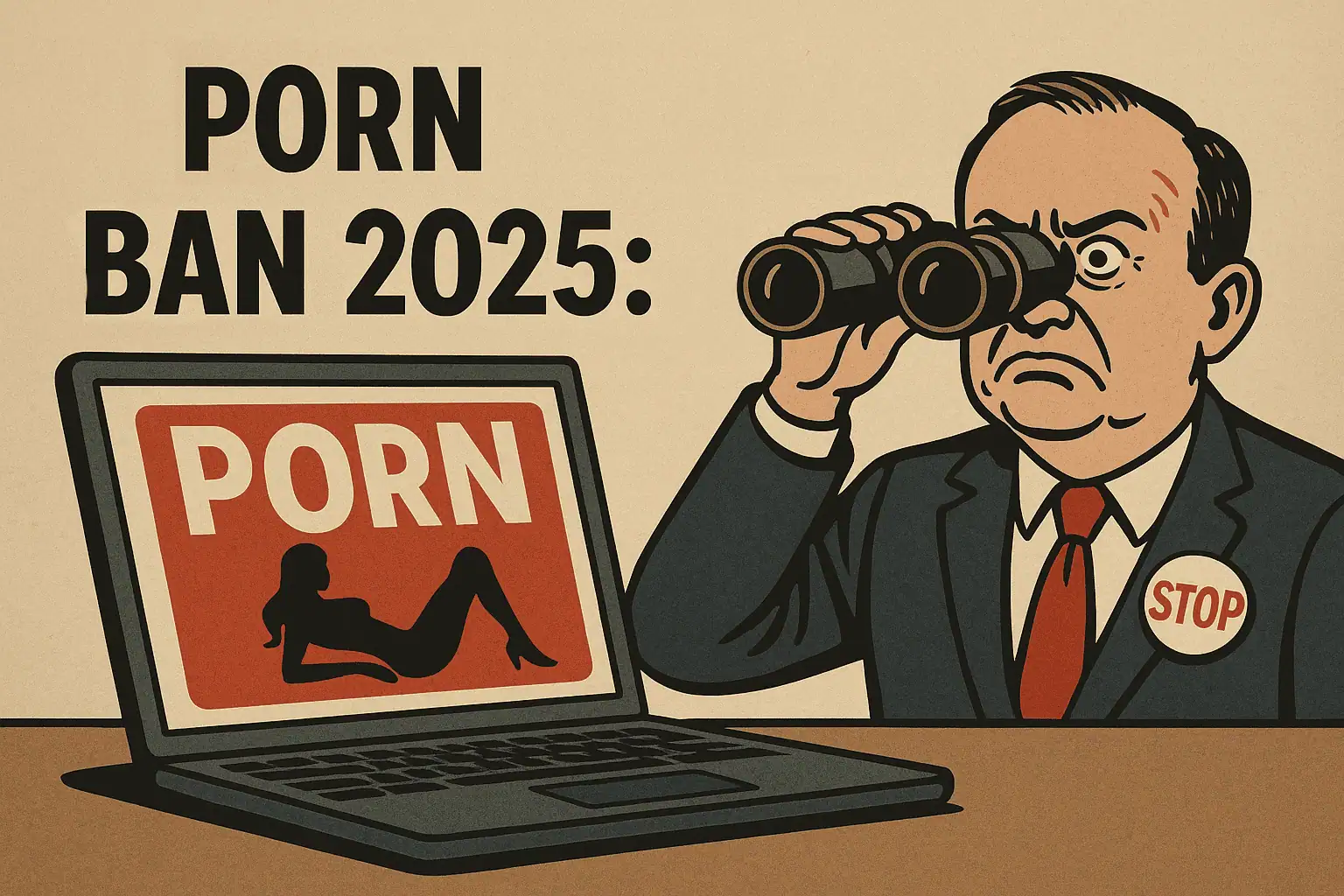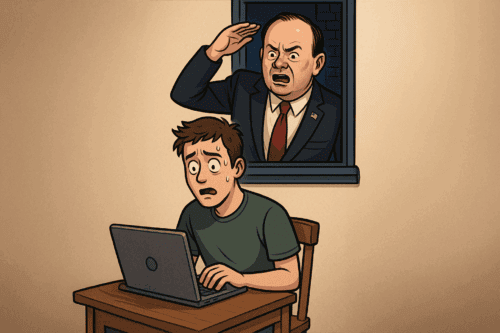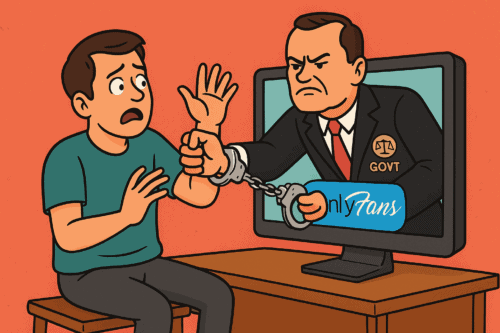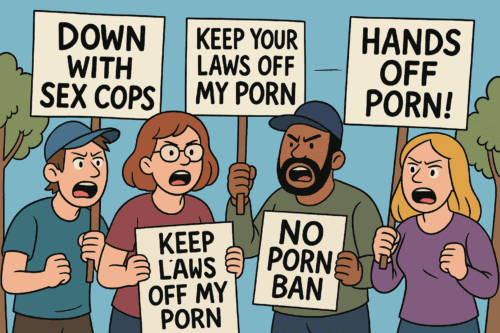
Porn Ban 2025: Hide Your Porn – Mike Lee’s Watching
Buck up, dear Internet users: Senator Mike Lee (R–UT) is on to us. In true cowboy-fashion, he’s introducing the Interstate Obscenity Definition Act (IODA) to ban — yes, ban — “porn” nationwide.
Crazy? Oh, you bet. We’ve seen dystopian warnings before, but this one is off the charts. This bill wouldn’t just change one city’s Netflix queue; it literally redefines obscenity across all 50 states. In one fell swoop, it throws out the old Miller test and average-Joe community standards, and says, “Let’s just blanket-censor basically anything with boobs or bits.”Welcome to the new Moral Patrol.
What is the Interstate Obscenity Definition Act?
So what exactly is IODA? It’s a slick-sounding title for a scorched-earth approach to regulating adult content. Senator Lee co-sponsors it with Rep. Mary Miller (R–IL), and together they admit the goal loud and clear: to “get porn off the internet.”
In Lee’s own words, “Our bill updates the legal definition of obscenity for the internet age so this content can be taken down and its peddlers prosecuted.”.In other words, he aims to put federal teeth in censoring anything sexy.
Lee’s press materials promise to “clarify the legal definition of ‘obscenity’ for all states”. Gone is the hodgepodge of state-by-state standards; everything is federalized. And Lee sneeringly dismisses our current “ever-changing and elusive public opinion” approach to sex, saying he’ll replace what “some average person” thinks with his own opinion. This isn’t incremental lawmaking — it’s a sledgehammer swing at free expression.

A Definition That Swallows The Internet
The core of IODA is a brand-new legal definition of obscenity that broadens the net immensely. Right now, federal obscenity law (the old Miller test) says something is obscene only if it: 1) appeals to “prurient interests” (i.e. a sicko interest in sex), 2) depicts sexual acts in a “patently offensive” way, and 3) lacks serious artistic, literary, political, or scientific value. That’s supposed to be pretty narrow. Normal racy magazine or even erotic art usually fails the “patently offensive” prong or the “no value” prong, and thus stays legal.
Lee’s new definition scraps most of those safeguards. It now says something is obscene if it only meets three conditions:
- (1) “taken as a whole, it appeals to the prurient interest in nudity, sex, or excretion” (notice now “nudity” and even “excretion” are listed explicitly).
- (2) “depicts, describes, or represents actual or simulated sexual acts” (normal or perverted, including any “lewd exhibition of the genitals”) with the objective intent to arouse, titillate, or gratify the sexual desires of a person.
- (3) “taken as a whole, [it] lacks serious literary, artistic, political, or scientific value”.
In short, any picture or video that titillates anyone’s sexual interest — no matter the context or value — becomes federal obscenity under IODA and part of the porn ban. As the Free Speech Coalition notes, this definition is gob-smackingly broad. When Lee himself paraphrases it, he’s basically outlawing all depictions of human sexuality: “virtually any depiction of human sexuality is obscene,” summarized one analysis. Even Game of Thrones isn’t safe: Woodhull Freedom Foundation’s Ricci Joy Levy warns the bill is “so broad” that mainstream TV could be swept up. (Yes, Aunt Nancy’s copy of GoT might land her in jail!)
Bye-Bye, Miller Test and Community Standards
In practice, Lee’s plan torpedoes the Miller test. No more “patently offensive” loopholes or asking what the average person or local community thinks. The bill explicitly jettisons state community standards and removes the Miller test’s 40+ year precedent. Remember Chief Justice Burger’s famous quote that Maine and New York don’t have to agree on sex? Lee just ignores that. Instead of “what would an average local person think is too lewd,” the federal government calls anything with nudity or sex obscene if it meets those prongs.
This shift is not just academic. It means the government — any prosecutor with a law degree — suddenly decides what is too much. Your home state’s standards? Out the window. It’s a classic top-down censorship move: if Lee’s office says it’s obscene, it’s a federal crime everywhere. “Basically, Lee wants to replace the average person’s opinion with his own,” one report snarks. And he’s dead serious. The press release even says it will “clarify” obscenity nationwide and remove vague “public opinion” protections.
Phones, Texts, and Webcam Panic
IODA doesn’t stop at definitions. It also rewrites the federal telecom censorship law. Currently, sending obscene images over the phone or internet is only a crime if you meant to “harass” or “threaten” someone. Lee’s bill axes that requirement. In other words, any erotic photo, sext, or nude selfie sent by phone becomes a federal crime, whether it’s harassing or not. A video chat between consenting adults? Illegal. A raunchy OnlyFans stream across state lines? Illegal. Texting your boyfriend an x-rated pic? Boom — federal offense.
What kind of content are we talking about? Any consenting sexy fun. Critically, these changes could criminalize sex workers and even private couples. All kinds of sex work done via webcam or phone could potentially be banned. Phone-sex lines and amateur livestream performers might suddenly need lawyers instead of toy subscriptions. It’s not just cartoonish hyperbole: by effectively outlawing any phone or video “obscene” call, this bill makes almost all porn, erotic art, and sex work federal crimes.
Creators and the Porn Ban
Think the bill only targets hardcore porn? Think again. The language about “graphic images” and “any picture” means regular art and media could be swept up. Elliot Page taking a bath on TikTok? Might as well hide that reel. One expert noted that any depiction of sexual content designed to gratify could be deemed obscene. Adult content creators, educators and even comedians are worried. If a sweet rom-com on Netflix shows a passionate kiss — or a legitimate documentary shows biology — could Lee’s definition flag it as appealing to prurient interest? The text sure invites that interpretation.
Even ostensibly innocent content might stumble over the new thresholds. After all, if it “appeals to sexual desires” it’s banned, period. Under this scheme, consenting nude art or textbook diagrams might have trouble proving serious value — because who decides? The bill’s champions. If Lee’s world prevails, the average person is powerless to save anything with boobies or genitals.

Some People Will Survive…
Not everyone is losing sleep. Extremists in the White House’s Project 2025 plan actually laud this move. The Heritage Foundation’s blueprint literally calls for a ban on porn and punishing producers, and even suggests teachers talking about sexuality be flagged as “pornographers.” Even “transgender ideology” is being lumped with porn as a crime. (Yes, Trump’s would-be second administration might check this off the list.)
Meanwhile, veteran First Amendment defenders call the bill “a mockery of the First Amendment”. Robert Corn-Revere, FIRE’s chief counsel, bluntly says he “can’t imagine anything about that definition surviving constitutional review”. Ricci Joy Levy of the Woodhull Foundation warns this is not about protecting kids or free speech — it’s about giving the government total control over sex.
All the lawmakers’ rhetoric about “keeping families safe” and targeting only the worst rings hollow. Recall Rep. Miller’s bluster: IODA, she claims, will give cops the tools to “target and remove obscene material from the internet” because it’s supposedly “alarmingly destructive”. But what is obscene is now up for grabs. If you can ban books on exploring the world of BDSM from a library, you might as well ban Netflix and chill. This is not age-verification (there are already 8 states doing that) — this is a blanket cultural takeover under the guise of law.
What Does It Mean For Me?
Spoiler: If you read this, you’re in trouble. Gay or straight, sex worker or librarian — the threat is broad. Right-wing book banners already equate LGBTQ stories to pornography, so it’s easy to imagine these kinds of outrageous laws accelerating that creep. Teachers discussing safe sex? Librarians stocking Bod Squad? Out of bounds. Even a casual chat about human bodies might be legally suspect.
At its core, IODA is about targeting speech. It could entangle anyone who creates or shares sexual content — from erotica to medical education. Artists, educators, librarians, and sex workers should be especially alarmed. Hardcore medical journals or Shakespeare’s poetry aside, we’re talking about throwing the First Amendment under the bus.
Netflix, OnlyFans, and the World at Stake
You know how people joke about Netflix censoring shadows? Well, here the feds do it. This isn’t just about a porn ban. If IODA passes, simply clicking “play next episode” could be an act of rebellion. Imagine being prosecuted for watching an HBO show with nudity — just a rated-R drama. This is the “broad picture” of Lee’s plan: censor culture wholesale.
On the Internet, the worry is global. After all, it covers all states and foreign communications. So, foreign porn hosting sites? New federal crime to send you a link. In reality, people are panicking. Critics ask: Would our grandparents have imagined we’d need VPNs for a rom-com? Under IODA’s “definition of obscenity,” maybe so. But that would probably be a crime.

Time to Speak Up about the Porn Ban!
This isn’t a drill. The proposed “porn ban 2025” looms over free speech like it’s the moral police unveiling. If you think this can’t happen in America, remember: no one in Congress has said “no way, that’s unconstitutional” yet. Contact your senators, join civil liberties groups, and share information.
We see the satire in all this — it feels wildly absurd — but the danger is real. Every word in this bill (from “prurient interest” to “obscene material”) could drag innocent people into court, chilling our First Amendment rights. We’ll quote Ricci Joy Levy again: game shows, art, anything could be swept up as obscene. This shouldn’t pass.
So what’s next? Rip off that “LOL” hat and get serious: Organize, tweet, donate, protest. Right now, porn companies and civil liberties groups like Woodhull Freedom Foundation are already mobilizing against IODA. Join them or form your own crew. Call your congressfolk and say: “We see what you’re doing, Senator Lee, and we’re not going quietly.” Free speech is on the line — and that includes our right to sexual expression, identity, and yes, a little raunchy humor. If you want to stay informed and support the conversation, check out jackandjilladult.com — because sexual freedom doesn’t survive in silence.

